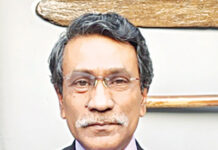The surplus of quality journalism in print, on the Web, and over the air should give the public little to no excuse for being uninformed about political issues. Never before has so much raw and refined political intelligence been available at such a low cost to citizens willing to buy a cheap computer and Web connection — or pay the bus fare to the local public library.
But uninformed the people are, as Ilya Somin delineates in his subversive new book, Democracy and Political Ignorance, and their ignorance is willful!
“The sheer depth of most individual voters’ ignorance may be shocking to readers not familiar with the research,” Somin writes on his first page. Many Americans don’t know how the government works, they don’t know much about who runs the government, and they’re clueless about how government programs work. For instance, a 2006 Zogby poll reported that only 42 percent of respondees could name the three branches of government. In another survey from that year, only 28 percent could name two or more of the five rights in the First Amendment, and a 2002 study indicated that 35 percent believed that the words “From each according to his ability to each according to his need” could be found in the Constitution. CNN found in its 2011 poll that Americans estimated on average that foreign aid consumes 10 percent of the federal budget when it actually takes up less than 1 percent.
Our political ignorance is as enduring as it is pervasive. When the Pew Research Center study compared the political knowledge of 1989 respondents with those from 2007 it found the advent of multiple 24-hour news channels, the C-SPAN channels, and hundreds of news sites on the Web had not moved the political ignorance dial in any appreciable way. Nor have massive rises in education over the past half-century put a dent in political ignorance, Somin finds. “On an education-adjusted basis, political knowledge may actually have declined, with 1990s college graduates having knowledge levels comparable to those of high school graduates in the 1940s,” he writes, even though IQ scores have been rising.
Assuming that political ignorance is a supply-side problem, some of our European friends have legislated an increase in political TV programming on private and public stations. That seems to have boosted political knowledge but most of the observed increases appear to be in the realm of international news. But Somin cautions his audience into reading too much in that finding: Americans have long exhibited less an interest in international news than those living in smaller European countries.
The public has been cashing the information dividends tossed off by new information technologies. But as Somin and others point out, most Americans are spending most of their new wealth on entertainment media — more football, more baseball, more online games, more movies and TV shows, and lots and lots more social media — and comparatively little on political information. Well-informed audiences are more likely to avail themselves to the new technologies to become better informed, according to a recent paper (pdf) Somin cites, “News vs. Entertainment: How Increasing Media Choice Widens Gaps in Political Knowledge and Turnout,” by Markus Prior. Total minutes of daily news consumption between 1994 and 2012 is down for all age groups, a 2012 Pew study reports.
We could try to mimic Europe — if the First Amendment allowed — and mandate more political news on TV, in print, and on the Web; government could regulate political news content in an attempt to increase its quality; and it could even be directly producing political news that it, and not PBS or NPR, supervised.
This sort of government intervention into the news media would be rightly attacked as political indoctrination and state propaganda, although Somin doubts (as do I) that the programs would have much effect on the populace. After all, unless drugged, strapped down in a straitjacket, and fitted with lidlocks, who would voluntarily watch Government Television when so much other stuff is available on cable and the Web? I doubt if even mandatory neural implants could change political IQ. As Somin puts it, “low political knowledge levels are primarily caused by lack of demand for information not lack of supply.”
Far from despairing at rampant and willful political ignorance, Somin accepts it as rational response in most cases, citing the work of economist Anthony Downs and his 1957 book An Economic Theory of Democracy. “Voters have little incentive to become informed because there is only an infinitesimal chance that any one vote will affect the outcome of an election,” Somin writes. Governmental functions have become so numerous and complicated, he continues, “few will take the time and effort to assimilate more than a small amount of political information.” For this reason, he states elsewhere in his book, we should be grateful that voter turnout is as low as it is, because increased turnout is often likely to increase the electoral effects of political ignorance by encouraging the unmotivated to vote.
If political ignorance can’t be eradicated, what is a democracy to do? Somin scours the literature for alternatives, discussing (among others) the “Deliberation Day” option, in which voters would be paid to attend political presentations by the parties; the restriction of voting rights to the informed citizens only; and the delegation of the political authority to experts (think of an appointed Federal Reserve Board running the government instead of the U.S. Congress).
None of the alternatives impress Somin, who brings his book to a close by suggesting that if the American people don’t know anything about their government and they don’t want to know anything about it — that if they’re not interested in monitoring and tending the colossus they’ve built — then maybe it shouldn’t exist on the scale that it does. He doesn’t put it in exactly those terms, but he does hold that downsizing and decentralizing the federal government would reduce the labor required to keep informed and thereby reduce voter ignorance.
“Democratic control of government works better when there is less government to control,” Somin concludes. As the public’s information options increase at Moore’s Law pace, no voter is ever likely to invest in knowing it completely until it shrinks.
Source: Bd news24










